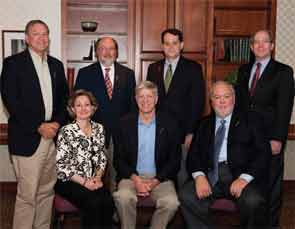

Time really does fly! It has been my great privilege to serve as president of this amazing organization, and the year really has flown past, both literally (approximately 130,000 miles) and figuratively. It seems like only yesterday I was on another flight writing my very first column, asking for your help in keeping the ACR afloat despite my presidency. I want to take this opportunity to sincerely thank the hundreds of you volunteers who took me seriously and have stepped up and given so generously of your time, talents, money, and, of course, advice. It is because of many of you that the ACR has had another banner year and, importantly, it is only because of you that we will remain an organization that we can—and should—be proud of.
The space provided does not allow me to do justice to all the important things that have been accomplished this year, but I would like to highlight a few to give you a small glimpse into the depth and breadth of your ACR. I will try to do so with a few questions.
What Is a Rheumatologist?
How often do we hear this question or suffer because so many do not know? Simple Tasks, the powerful public relations campaign launched in 2011 by the ACR, is changing all that. As more and more of us wear our fork lapel pins (see photo at right) and explain rheumatology to the many who ask about them, the word is spreading. Certainly the folks on Capitol Hill know us by our forks. Additionally, when our pharmaceutical partners mention in their direct-to-consumer ads, “See your rheumatologist,” we have asked them to add “the specialist in rheumatic diseases” or a similar phrase. It is a big job, but we are making progress. Get a fork and wear it, you will see what I mean—people cannot resist asking about them!
Who Will Have the Data to Control Our Future?
Information and data are power. It has been said that whoever controls the information/data has the power. It is critically important that the ACR is in control. To this end, the ACR Registry and Health Information Technology Committee (RHIT) has made significant progress taking the next big step to assure that the ACR has this information. This year the Registry has been integrated with several electronic health records and this whole process is rapidly moving forward. Currently, the Registry is useful for Centers for Medicare and Medicaid Services documentation, practice-improvement modules, and benchmarking. Soon all of these functions will be dramatically expanded and made more seamless. We are working toward the day when the Registry will be useful for all of the above as well as multiple other functions, including research and postmarket surveillance. Most importantly, when it matures, the Registry will allow us to demonstrate the tremendous value that rheumatologist bring to the table.
How Will We Get the Influencers to Listen to Us?
The answer is by building relationships. Healthcare is changing and will continue to change—we must ensure that the interests of rheumatologists and our patients are considered when important decisions are being made. This year we have set new records in the number of Capitol Hill visits we have made (185 in September alone) and contributions to RheumPAC (over $120,000). Simple Tasks is taking hold on the Hill. Many lawmakers have seen our advertisements, received campaign materials, and reviewed the campaign white paper and videos! We have built new, expanded relationships with the American College of Physicians (they have 130,000 members to our 9,000) and fellow subspecialty societies and helped to lead newer coalitions such as the Coalition for Accessible Treatments and Cognitive Specialty Coalition. We have also been successful in keeping a rheumatology seat at the American Medical Association (many thanks to all of you last-minute joiners). These collaborations have lead to the introduction of important bills, including a Sustainable Growth Rate fix that would give a pay bump to rheumatologists and a bill to prohibit Tier IV pricing. These are all important, but we can—and, with your help, will—do better.
How Will Rheumatology Remain Relevant?
The answer is with all of the above: Simple Tasks, having the data to demonstrate our value, building our Capitol Hill relationships, partnering with other organizations, and, importantly, taking credible positions on key healthcare issues. Our guidelines, our decision to provide certification and reasonableness criteria for musculoskeletal ultrasound, and the upcoming release of our “top five” list for the Choosing Wisely campaign are important examples of the latter.
Where Will the Next Generation Come From?
Our academic institutions are responsible for the training of our entire workforce. The health and vitality of rheumatology divisions are responsible for making people interested in our specialty in the first place. Without robust divisions, there will be no next generation of rheumatologists and health professionals to take care of patients with rheumatic disease, let alone answer the next generation of questions. The economic stresses of the last few years and healthcare changes have precipitated a funding crisis that severely threatens the future of many, if not most, of these divisions. We are deeply indebted to Michael Holers, MD, and David Fox, MD, who have led a talented group of volunteers on the Blue Ribbon Panel on Academic Rheumatology. Their report was presented to the ACR board of directors in November and will help guide the way to a brighter future.

What Will the ACR Look Like in 2020?
To be proactive in acknowledging that the wants and needs of our membership, our volunteers, and our customers will all be significantly different in 2020, the ACR, under the leadership of David Borenstein, MD, put together the 2020 Task Force. Chaired by Peter Embi, MD, MS, this task force is made up of young members who will be our primary volunteer base in 2020. This task force has labored long and hard this past year to develop a white paper. The white paper, a forecast of external changes and internal recommendations for the ACR to consider, was presented at the November board of directors meeting. This forecast will be used as a resource in developing the next ACR strategic plan and will set us on the course for continued success.
What’s in a Name?
Important and well-thought-out significant name changes have been made in two critically important areas. Our flagship journal A&R will remain A&R, but over the next several years will transition from the dated Arthritis & Rheumatism to a more modern Arthritis & Rheumatology.
In order to take full advantage of its stellar reputation, including its four-star Charity Navigator rating, our Research and Education Foundation is now the Rheumatology Research Foundation. It is believed that this change will make a significant difference as we seek to raise awareness among lay donors.
I am deeply indebted to so many of you, including all the volunteers but especially the Committee Chairs, the Board of Directors (see April’s “President’s Perspective”), and, of course, the incredible Executive Committee—Audrey Uknis, MD, Joseph Flood, MD, E. William St.Clair, MD, Benjamin Smith, PA-C, David Daikh, MD, PhD, and David Karp, MD, PhD, (pictured at left, all wearing our forks). Importantly, I continue to be impressed and certainly am profoundly grateful for the amazing staff that Mark Andrejeski, with his 25 years of experience, continues to amass. A special note of gratitude is owed to Julie Anderson, who so ably takes care of the president, a particular challenge this year.
I would ask you all to continue to support the ACR and the Foundation with all of your time, talent, and contributions (to the Foundation and to RheumPAC). None of us are happy with the state of healthcare and where the rheumatologist falls in the pecking order. None of us will be happy with everything that the ACR is doing or with all of the things it is not doing—nor should we be. That is one of the big reasons we need everyone’s contributions. It is easy to complain, but not always easy to do so productively. We can be proud that we represent all of rheumatology, including practice, academic, and health professionals. With your help, we can do better! Step up to the plate, check your own agenda in the dugout, and help the ACR continue to Advance Rheumatology. Thanks for an interesting, never boring, and wonderful year.
Dr. O’Dell is director of the Internal Medicine Residency Program and division chief of rheumatology at the University of Nebraska, Omaha and the Omaha VA medical centers. Contact him via e-mail at [email protected].